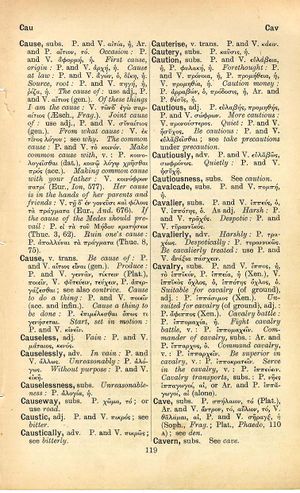cause: Difference between revisions
φελένη καὶ φάναξ καὶ φοῖκος καὶ φαήρ → Ἑλένη καὶ ἄναξ καὶ οἶκος καὶ ἀήρ | Helen, lord, house, and air
(Woodhouse 2) |
(CSV3) |
||
| Line 1: | Line 1: | ||
{{ | {{Woodhouse1 | ||
| | |Text=[[File:woodhouse_119.jpg|thumb|link={{filepath:woodhouse_119.jpg}}]]'''subs.''' | ||
P. and V. [[αἰτία]], ἡ, Ar. and P. αἴτιον, τό. | |||
<b class="b2">Occasion</b>: P. and V. [[ἀφορμή]], ἡ. | |||
<b class="b2">First cause, origin</b>: P. and V. [[ἀρχή]], ἡ. | |||
<b class="b2">Cause at law</b>: P. and V. [[ἀγών]], ὁ, [[δίκη]], ἡ. | |||
<b class="b2">Source, root</b>: P. and V. [[πηγή]], ἡ, [[ῥίζα]], ἡ. | |||
<b class="b2">The cause of</b>: use adj., P. and V. [[αἴτιος]] (gen.). | |||
<b class="b2">Of these things I am the cause</b>: V. τῶνδʼ ἐγὼ [[παραίτιος]] (Aesch., <b class="b2">Frag.</b>). | |||
<b class="b2">Joint cause of</b>: use adj.: P. and V. [[συναίτιος]] (gen.). | |||
<b class="b2">From what cause</b>: V. ἐκ τίνος λόγου; see [[why]]. | |||
<b class="b2">The common cause</b>: P. and V. τὸ κοινόν. | |||
<b class="b2">Make common cause with</b>, v.: P. κοινολογεῖσθαι (dat.), κοινῷ λόγῳ χρῆσθαι [[πρός]] (acc.). | |||
<b class="b2">Making common cause with your father</b>: V. [[κοινόφρων]] πατρί (Eur., <b class="b2">Ion</b>, 577). | |||
<b class="b2">Her cause is in the hands of her parents and friends</b>: V. τῇ δʼ ἐν γονεῦσι καὶ φίλοις τὰ πράγματα (Eur., ''And.'' 676). | |||
<b class="b2">If the cause of the Medes should prevail</b>: P. εἰ τὰ τοῦ Μήδου κρατήσειε (Thuc. 3, 62). | |||
<b class="b2">Ruin one's cause</b>: P. [[ἀπόλλυμι|ἀπολλύναι]] τὰ πράγματα (Thuc. 8, 75). | |||
'''v. trans.''' | |||
<b class="b2">Be cause of</b>: P. and V. [[αἴτιος]] εἶναι (gen.). | |||
<b class="b2">Produce</b>: P. and V. γεννᾶν, τίκτειν (Plat.), ποιεῖν, V. φυτεύειν, τεύχειν, P. ἀπεργάζεσθαι; see also [[contrive]]. | |||
<b class="b2">Cause to do a thing</b>: P. and V. ποιεῖν (acc. and infin.). | |||
<b class="b2">Cause a thing to be done</b>: P. ἐπιμέλεσθαι [[ὅπως]] τι γενήσεται. | |||
<b class="b2">Start, set in motion</b>: P. and V. κινεῖν. | |||
}} | }} | ||
Revision as of 09:24, 21 July 2017
English > Greek (Woodhouse)
subs.
P. and V. αἰτία, ἡ, Ar. and P. αἴτιον, τό.
Occasion: P. and V. ἀφορμή, ἡ.
First cause, origin: P. and V. ἀρχή, ἡ.
Cause at law: P. and V. ἀγών, ὁ, δίκη, ἡ.
Source, root: P. and V. πηγή, ἡ, ῥίζα, ἡ.
The cause of: use adj., P. and V. αἴτιος (gen.).
Of these things I am the cause: V. τῶνδʼ ἐγὼ παραίτιος (Aesch., Frag.).
Joint cause of: use adj.: P. and V. συναίτιος (gen.).
From what cause: V. ἐκ τίνος λόγου; see why.
The common cause: P. and V. τὸ κοινόν.
Make common cause with, v.: P. κοινολογεῖσθαι (dat.), κοινῷ λόγῳ χρῆσθαι πρός (acc.).
Making common cause with your father: V. κοινόφρων πατρί (Eur., Ion, 577).
Her cause is in the hands of her parents and friends: V. τῇ δʼ ἐν γονεῦσι καὶ φίλοις τὰ πράγματα (Eur., And. 676).
If the cause of the Medes should prevail: P. εἰ τὰ τοῦ Μήδου κρατήσειε (Thuc. 3, 62).
Ruin one's cause: P. ἀπολλύναι τὰ πράγματα (Thuc. 8, 75).
v. trans.
Be cause of: P. and V. αἴτιος εἶναι (gen.).
Produce: P. and V. γεννᾶν, τίκτειν (Plat.), ποιεῖν, V. φυτεύειν, τεύχειν, P. ἀπεργάζεσθαι; see also contrive.
Cause to do a thing: P. and V. ποιεῖν (acc. and infin.).
Cause a thing to be done: P. ἐπιμέλεσθαι ὅπως τι γενήσεται.
Start, set in motion: P. and V. κινεῖν.

